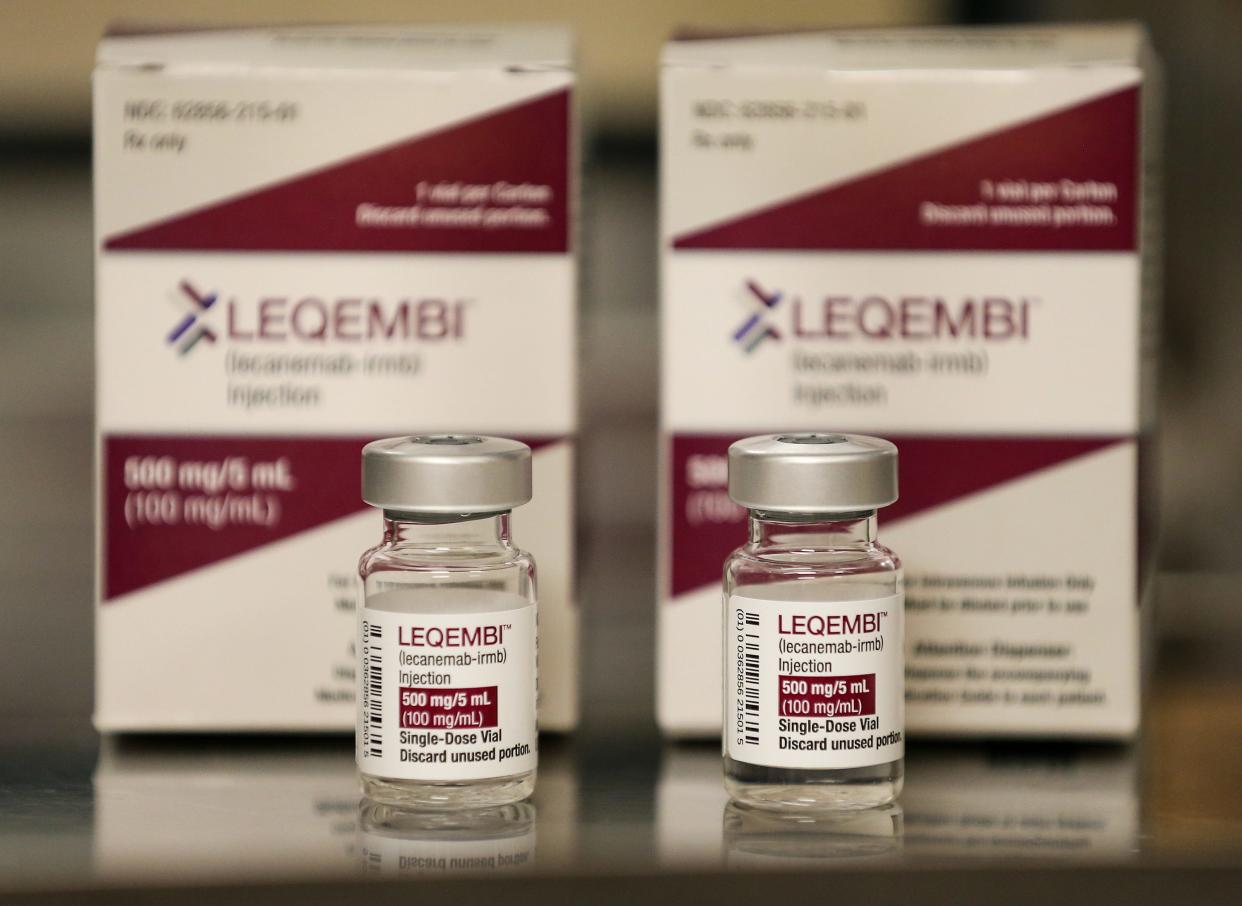Here are 5 things to know about Lecanemab, the new Alzheimer’s treatment

A year ago, the Food and Drug Administration approved a drug that could be a turning point for eventually finding a cure for Alzheimer's disease.
Louisville's Norton Neuroscience Institute emerged late last summer as an early leader in the country for administering infusions of Lecanemab. As clinics throughout the country have slowly built the infrastructure needed for infusion centers, Norton Healthcare's program has grown from just a handful of patients taking infusions at the onset to more than 70. Some families drive as far as 90 minutes every two weeks with the hope of delaying the progression of the heartbreaking disease.
Studies show that Lecanemab can slow the disease's progression by 30% and somewhere between one-sixth and a third of Alzheimer's patients will be candidates for the infusions.
The drug has limitations, though. The infusions don't stop or cure memory loss. Instead, it removes an abnormal protein that appears in Alzheimer’s patients’ brains, which can buy patients more time with their memories. And the infusions also only work for Alzheimer's and dementia patients in the earliest stages of memory loss.
Dr. Greg Cooper, the chief of adult neurology and director of the Memory Center at Norton Neuroscience Institute, and his team were the first in this region to administer Lecanemab. Nationwide upward of 3,000 people are on the drug as of early February.

Six months into the program, The Courier Journal checked in with Cooper to learn more about the drug, and how it's working for some of the first patients in Louisville.
This interview has been edited lightly for context and clarity.
COURIER-JOURNAL: How does Lecanemab slow down the progression of Alzheimer's?
Cooper: Lecanemab is a monoclonal antibody that is infused into the bloodstream, and that antibody targets an abnormal protein in the brain called beta amyloid, which is the protein that we see in Alzheimer's disease.
So, it targets that protein... and essentially using the immune system, it removes it from the brain.
The prevailing hypothesis in Alzheimer's disease is that it's the presence of amyloid that triggers a whole cascade of events that leads to Alzheimer's disease. The thought is if we remove that amyloid, we take away that trigger, and that's what slows the disease down.
More: Norton emerging as a top program for new Alzheimer's drug. What it means for patients
CJ: This drug is only for people with mild cognitive impairment. What is the difference between mild cognitive impairment and moderate cognitive impairment?
Cooper: It is a little bit of a fuzzy line. It's an arbitrary line. What we will often use is a score on one of our memory tests, and the one we most commonly use is called the MMSE or mini-mental state exam. It has a score from zero to 30, and most commonly, people will say 20-30 is mild, 10-20 is moderate, and 0-10 is severe. To qualify for this particular drug, it's even more stringent. Your score has to be 22 or above.
Another way is looking at the patient's activities. (Moderate cognitive impairment involves) more need for assistance with managing finances, bills, medications, meals, shopping, picking out your clothes, and things like that. You're going to start seeing more difficulty with daily living activities. You can see some of that in the mild phase, but you see a much greater need for day-to-day assistance when you get into that moderate stage.
CJ: What are some of the side effects and risks of the Lecanemab?
Cooper: So just slightly more than a quarter of patients will have an infusion reaction, and that's usually things like headache, fever, chills, and nausea. Usually, that's going to be fairly mild, and something that is treated very easily with medicines like Tylenol. And in fact, we can often pre-medicate people, so they don't have an infusion reaction. So it's important to tell people about that, but that doesn't worry us too much.
What we're really worried about is ARIA — amyloid-related imaging abnormalities — or swelling or bleeding in the brain. About 21% of people, so about one in five, will have some degree of ARIA. That's the bad news. The good news is most of those people don't have symptoms.
We discover it because we do MRI scans looking for it, and if we see it during a scan, depending on the degree, we may hold treatment to let them recover from that.
Overall, 2.8% have symptoms of ARIA like headache, nausea, blurred vision, and confusion. In some cases that can be severe enough that someone would go to the hospital. We haven't had that happen yet, but we will. Experts are saying that, very rarely, they expect this may even be life-threatening.
CJ: How much does Lecanemab cost patients?
Cooper: That has been a battle. This is approved by Medicare. If someone has Medicare without a supplement, it pays for the drug, but they have a 20% co-pay. And with a price tag of $26,000 a year for the drug, 20% is not insignificant.
If someone has a Medicare Advantage, which more than half of people do now, we have had significant struggles getting that paid for, at times. We have had to rely on patient assistant programs, at times.
What I was told to expect is a typical patient would pay as little as $0 a month, maybe as high as $400 or $500 a month, depending on what their payer status was.
We have, with a lot of effort, been able to manage it pretty well, I think. But we had to hire people who do nothing but administer this program, so it’s not a light lift.
CJ: What results are you seeing from Lecanemab?
Cooper: Right now, all the signals we're getting back are optimistic. People are telling us they think they're doing well, and they're not seeing much progression.
Now, there are potential reasons for that. What I'd love to find out is that the drug is working, even better than we thought it would from the clinical trial.
It is also possible that we're so early on (in the onset of the disease) that someone has not changed much over three months or six months. The truth with this disease is that (progression) may or may not have changed a lot over that time. So, it may be too short of a period to measure that very well.
Also, just with the excitement of this, there is optimism that comes with it and the increased stimulation is part of it. Yes, it's a hassle to come back every couple of weeks for an infusion, but that's also stimulating your brain to some degree.
I believe that the medication is going to help people. I don't think it's entirely clear yet just how much it's going to help people.
Reach reporter Maggie Menderski at mmenderski@courier-journal.com.
This article originally appeared on Louisville Courier Journal: 5 things to know about Lecanemab, the new Alzheimer’s treatment

